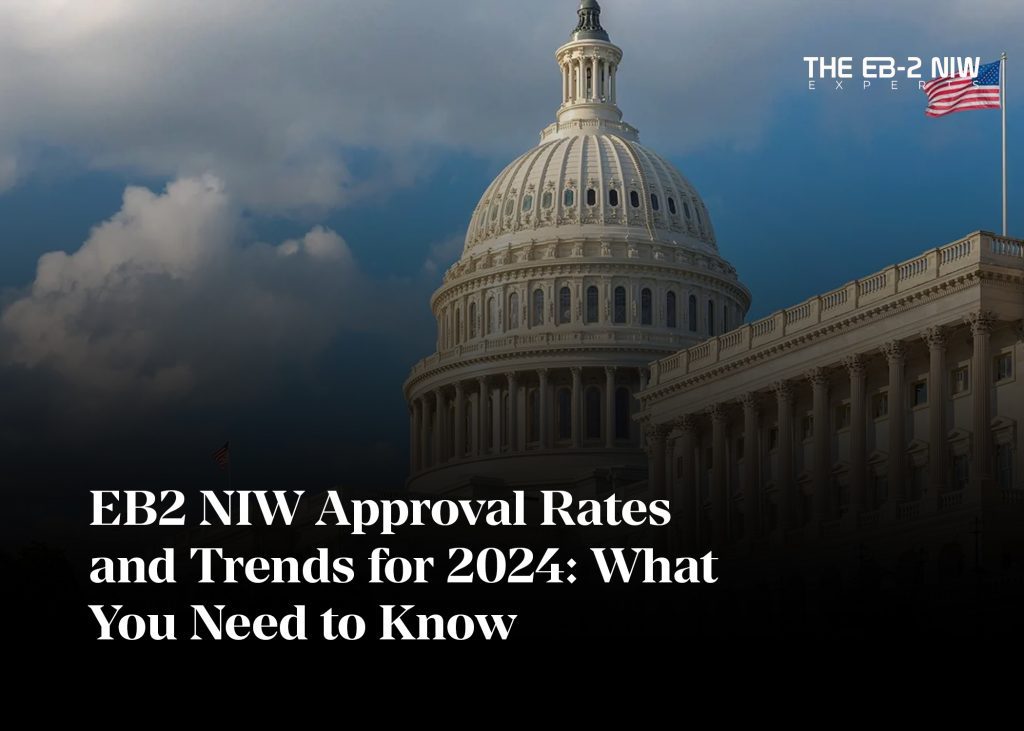The Employment-Based Second Preference National Interest Waiver (EB2 NIW) visa is a powerful pathway for highly skilled individuals to live and work in the United States without the need for a sponsoring employer. This unique category within the EB-2 visa classification allows certain professionals, researchers, scientists, entrepreneurs, and other experts to obtain a green card if their work serves the national interest of the United States.
As we enter 2024, EB2 NIW applicants and stakeholders alike are eager to understand the latest trends in approval rates, processing times, and any changes to eligibility requirements that could affect their applications. Here’s what you need to know about the EB2 NIW approval landscape and the significant trends that could impact your path to U.S. residency.
What is EB2 NIW?
The EB2 NIW visa is a category designed for individuals who qualify for the EB-2 visa but seek to waive the standard job offer and labor certification requirements if their proposed work benefits the U.S. The waiver is granted if the applicant’s endeavor aligns with a “national interest” and meets specific criteria:
- The proposed endeavor must be of substantial merit and national importance.
- The applicant must be well-positioned to advance the proposed endeavor.
- The national interest would be adversely affected if the applicant had to secure an employer sponsor.
Given its unique requirements and the high level of scrutiny it attracts, the EB2 NIW visa is one of the most competitive visa categories.
If you’re considering applying for an EB2 NIW visa, it’s crucial to understand the application trends, the factors influencing approval rates, and the steps to maximize your chances of success.
To learn more about the EB2 NIW visa and how it can benefit your career, visit EB2 NIW Experts.
Approval Rates for EB2 NIW in 2024
Approval rates for EB2 NIW petitions fluctuate based on factors such as changes in U.S. immigration policies, economic considerations, and evolving national interest criteria. Here’s a look at what approval rates might look like for 2024 based on recent trends:
- Consistent Approval Rates for Highly Qualified Candidates: According to USCIS data, EB2 NIW approval rates have remained steady for applicants who meet or exceed the national interest waiver criteria. While each case is adjudicated individually, candidates with extensive experience, significant achievements, and a well-documented case that aligns with national priorities see higher approval rates.
- Influence of Biden Administration Policies: The Biden administration has supported initiatives to streamline legal immigration pathways, focusing on skilled workers in critical sectors like STEM, healthcare, and infrastructure. Applicants in these fields may find an advantage in approval rates, especially if their work aligns with national goals. Check the latest updates on USCIS’s newsroom for policy shifts.
- Field-Specific Variations: STEM-related applications tend to have higher approval rates, given the ongoing emphasis on technology, healthcare, and infrastructure. Professionals in research, data science, engineering, and medical fields may have an advantage if they can demonstrate a substantial, lasting impact on their sector.
For further guidance, connect with experts in the field. See EB2 NIW Experts’ services for professional assistance in crafting a compelling petition.
Key Trends Influencing EB2 NIW Approvals in 2024
- Increased Scrutiny and Evidence Requirements: USCIS has tightened its focus on ensuring that each applicant’s work significantly impacts U.S. interests. As a result, the burden of proof has risen. Petitioners are encouraged to include comprehensive evidence, such as professional publications, citations, endorsements from recognized authorities, and substantial documentation demonstrating the endeavor’s national importance.
- More Stringent Adjudication for Certain Sectors: Applicants in non-STEM fields might encounter increased scrutiny. For instance, while business and entrepreneurial candidates can qualify, they need to provide detailed business plans and demonstrate the national significance of their work.
- Demand for Exceptional Documentation: Documentation plays a critical role in 2024, where applicants must thoroughly explain how their work uniquely aligns with U.S. interests. USCIS is more likely to approve applications that include robust proof of impact, such as groundbreaking research, patents, or demonstrated influence on a national scale.
- Changing Priorities in National Interest: As U.S. priorities shift in response to global and domestic issues, USCIS may focus on industries addressing cybersecurity, climate change, clean energy, and advanced manufacturing. Applicants whose work aligns with these emerging areas may find that USCIS is more inclined to support their petitions.
Visit EB2 NIW Experts’ blog for updates and insights on how changes in national priorities might impact your application.
2024 Tips for a Successful EB2 NIW Application
For 2024 applicants, the focus should be on presenting a strong case that meets the stringent criteria set by USCIS. Here are several practical tips to enhance your chances of approval:
- Emphasize National Impact: Explain how your work addresses U.S. challenges, enhances national security, or contributes to economic growth. Use clear and quantifiable examples.
- Showcase Your Unique Qualifications: Go beyond just listing your qualifications. Illustrate how your background uniquely positions you to succeed in your endeavor and why someone with your expertise is crucial to the U.S.
- Compile Extensive Evidence: Documents like academic papers, awards, patents, or letters of recommendation from experts in your field are essential. Ensure each document directly supports your claim of national importance.
- Consult with Experts: Given the complexities of the application process, consulting an EB2 NIW specialist is wise. An experienced attorney or consulting service can help structure your application to highlight your strengths and increase the likelihood of approval. For personalized guidance, consider reaching out to EB2 NIW Experts.
- Stay Updated on USCIS Policy Changes: Immigration policies can change rapidly, impacting application requirements and priorities. Make it a habit to review announcements from USCIS. Regularly visiting USCIS’s newsroom can help you stay informed about the latest immigration policy changes.
Understanding Processing Times and Backlogs in 2024
The EB2 NIW processing times can vary, typically ranging from 8 to 14 months. For applicants from countries with high demand (e.g., India and China), processing delays may be more substantial due to annual visa caps and backlogs.
- USCIS Initiatives to Reduce Processing Times: The agency has introduced measures to speed up the processing of employment-based visas. However, these improvements may primarily benefit applicants in high-priority sectors.
- Backlogs for Certain Countries: High-demand countries continue to face significant delays. If you’re from a country with high demand, it’s beneficial to submit a thoroughly prepared application that minimizes the risk of a Request for Evidence (RFE), which can prolong the process.
For up-to-date guidance on navigating these challenges, explore EB2 NIW Experts and consider consulting with specialists who can offer insight into handling backlogs effectively.
Is EB2 NIW Right for You in 2024?
The EB2 NIW visa offers a unique path for skilled individuals to secure a green card without employer sponsorship. With steady approval rates, the opportunity is substantial for those with a well-crafted application that aligns with U.S. priorities. However, given the increased scrutiny, evolving national priorities, and heightened requirements for evidence, it’s essential to approach this process with a strategic mindset.
Partnering with experienced consultants, like EB2 NIW Experts, can be invaluable for navigating the complexities of the application. Not only can they assist in aligning your application with USCIS expectations, but they can also help you adapt to new trends and requirements in the EB2 NIW landscape.
Conclusion
As we move into 2024, the EB2 NIW approval landscape promises both opportunities and challenges. While there is a demand for skilled individuals who can contribute to national interests, the path to approval demands meticulous planning and strategic documentation. Staying informed of trends, understanding the approval criteria, and seeking expert guidance can significantly increase your chances of success.
For personalized advice, check out the services offered by EB2 NIW Experts, and take your first step toward achieving your goal of U.S. residency. With careful preparation, your endeavor can contribute to national interest and secure your future in the United States.


